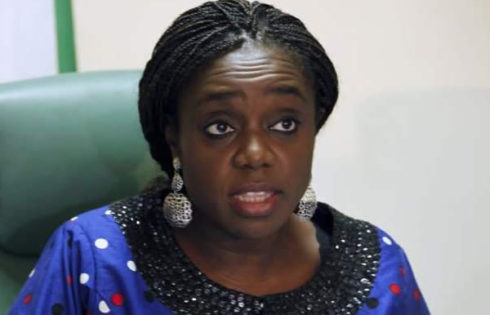
 Earlier in the year, the federal Government set up the Efficiency Unit in the Federal Ministry of Finance as part of its plans to reduce both overhead and other costs and wastages. Towards this end, government recently banned the procurement and distribution of conference Bags-Shirts and other souvenirs at conference and seminars funded by Federal Ministries, Department and Agencies (MDAs).
Earlier in the year, the federal Government set up the Efficiency Unit in the Federal Ministry of Finance as part of its plans to reduce both overhead and other costs and wastages. Towards this end, government recently banned the procurement and distribution of conference Bags-Shirts and other souvenirs at conference and seminars funded by Federal Ministries, Department and Agencies (MDAs).
Allowances of board members of government agencies were also cut by almost 50 to 70 percent as part of the new policy. Even travels by First class and business class have been banned in the new initiative.
The ban was in continuation of the on-going cost cutting and efficiency drive by the present administration in the utilization of public funds. This however was setup also to review the FG’s overhead expenditure, reduce wastage, promote efficiency and ensure quantifiable savings for the country.
The activities of the Unit will be supervised by a steering committee which consist of Minister of Finance Mrs. Kemi Adeosun, the Head of Civil Service Federation ,the Auditor General of the Federation, the Accountant General of the Federation, Budget Office of the Federation ,Alhaji A. Mohammed- Past President of Institute of Chartered Accountant of Nigeria (ICAN),Mr. Kunle Elebute- Partner and Head Advisory Service KPMG, Mr. Seyi Kumapayi- Chief Financial Officer Access Bank Plc, and Mrs. Patience Oniha –Head of the Efficiency Unit.
Speaking at a media interaction in Abuja, the Head of the Efficiency Unit, Mrs. Patience Oniha told journalist that the Federal government Ministries, Department and Agencies, MDAs, would be given price guidelines for their procurements. The idea is hinged on the knowledge of the prices of various items at which producers and suppliers sell to others end users, especially in the private sector, that will guide in producing a template of prices within which public purchases can be made.
She said “available records have confirmed that presently, the nation’s recurrent expenditure completely dwarfs capital expenditure by a ratio of 84/16. This includes non-wage related overhead expenditure such as travel costs, entertainment, events, printing, IT consumables, stationeries amounting to N825 billion ,representing 61%of the Cumulative Total Overhead Expenditure of N1,353 billion for 2012-2014, which means the average amount expended annually on these items during this period.
As at September 2015, the entire capital expenditure was just N194bn while overhead expenditure was N272bn”. This scenario is considered unsustainable and at variance with the current administrations resolve to reform the economy and reduce the cost of governance.
According to the Minister of Finance, Mrs. Kemi Adeosun, the Efficiency Unit will undertake programmed reviews of all government overhead expenditure with a view to reducing wastage, promoting efficiency and ensuring quantifiable savings for the country. However, government would be able to save N4.14 billion from the Efficiency Unit on travels yearly with appropriate streamlining of procurement process. Specifically, the Efficiency Unit will work across all MDAs to identify and eliminate wasteful spending, duplication and other inefficiencies; identify best practices in procurement and financial management and share such knowledge to ensure its adoption.
The creation of an Efficiency Unit as a public sector reform initiative has the following unique benefits for Nigeria as it would be used as a tool for saving costs, providing learning opportunities for Government which will result in long term benefits. It is also participatory as the MDAs are involved, rather than top-down which makes acceptance and the institutionalization of a culture of efficiency easier. It has the potential for introducing other reforms in the public sector for public good.
The initiative has become imperative for Nigeria due to the country’s dependence on crude oil for foreign exchange and revenue which has made the Nigerian economy vulnerable to shocks in the international oil markets. The impact of the recent collapse in crude oil prices on Nigeria’s External Reserves, the Naira Exchange Rate and revenues are testament to the urgent need to review the manner in which increasingly limited Government revenues are spent.
Also tied to its desirability is the disproportionate and not too commensurate share of Recurrent Expenditure to Capital Expenditure which has constrained the development of infrastructure. Such spending pattern that is biased against spending on capital projects is inimical to growth and development as they invariably promote or support wastage and inefficiency.
Moreover, there is the need to ensure that Government’s resources are used in the most efficient manner so that citizens get value for money and that more funds are available for capital projects. The Cost Savings activities of the Efficiency Unit are a key reform initiative towards achieving this objective. The creation of an Efficiency Unit is the first time that the Government is taking a bold initiative to cut down on its expenditure with a view to eliminating waste and inefficiencies.
The Federal Government has towed the part of reason especially in a period of lean financial resources. It must eliminate unnecessary expenditure on overheads in order to release funds for infrastructure. The steps taken so far are commendable. While Nigerians are not unmindful of the gains of the present move by the government, it must insist that eliminating wastages in public spending ought to be a permanent feature of governance.
